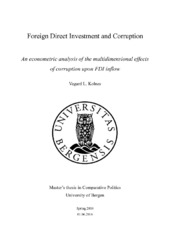Foreign Direct Investment and Corruption. An econometric analysis of the multidimensional effects of corruption upon FDI inflow
Abstract
The goal of this thesis is to estimate the effect of corruption upon the levels of FDI inflow and it poses the following research question: What effect does corruption have upon the level of foreign direct investment inflow to a country? Moreover, do internal types of corruption (e.g. bureaucratic corruption), and external contexts (e.g. level of development) affect the manner in which corruption affects foreign direct investment inflow to a country? The thesis attempts to clear up a contention in the literature in which the effect of corruption upon FDI inflow is contested. It does this in two ways. First, proposing a theoretical framework to understand the effects corruption can have by fusing together elements from political risk theory and the OLI-paradigm. Second, using a relatively unused econometric method, which allows one to use a random effects model to distinguish between the effects which key independent variables have: (1) across time within" countries and (2) between" countries. Panel data from 1995 - 2012 are employed with a global coverage. The dataset is compiled from three different original datasets. The findings of the thesis suggests that the effect of corruption is on average negative for FDI inflow. However, the thesis also finds that the effect of corruption is very dependent on context. In some contexts, corruption is found to have a positive effect on FDI inflow in this thesis. Unfortunately, the data for different types of corruption are not good enough to perform reliable estimations. The results show in a clear manner that the contention in the field is due to systematic differences produced by different estimation techniques, and an overly simplified view of what corruption is. The suggested theoretical framework is able to explain the results and incorporate the different findings of the literature and this thesis by focusing on corruption as a multidimensional phenomenon.
